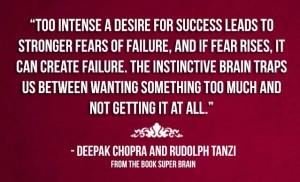Overheard in an advancement office near you: “It’s business, not personal.” “A pro learns to compartmentalize.”…“A bit of fear keeps them sharp.”… Is that true? Or are we whole humans whom fear makes dull? What impact does stress have on our ability to be not just good, but truly great at our important work?
Do you try to avoid messy emotions in the workplace? Make goals and metrics scary- ambitious to drive effort in yourself and your team?
I get it—I’ve done it—we got here honestly. From first grade on, we learned to ignore discomfort, focus on our left verbal brain, and ignore the wisdom of our right brain, our body, our emotions. But advancement work requires that we learn to engage both sides again.
Living exclusively in the left, verbal brain ignores a big chunk of an advancement professional’s whole human system. Anxiety results when our bodies get left behind. As we pursue enormous campaign goals in competitive times, neuroscience and positive psychology have much to share about the corrosive effects of unacknowledged anxiety in our development shops—and much to teach about learning to work with mindfulness and ease.
Human beings run on three operating systems—cognitive, emotional, and physical—that are designed to work in sophisticated synchrony. When your mind has a thought, it creates an emotion that is felt in the body. The body reacts. The mind may overlook this response or heed its message. We can learn to use this finely tuned system of checks and balances to achieve delicious productivity—but only if the system is kept healthy, open, and clean.
As a lifelong fundraiser, now a consultant and coach, I help my clients ensure that their thoughts, feelings, and physical sensations are not ruled by toxins like fear and harsh self-judgments that can inhibit their performance and cause pain.
Many campaign consultants sidestep the emotional and physical components of the human machine, providing benchmark reports and prescribing big jumps in total gift income and visits per month before fully understanding why fundraising progress is slow. At organizations that anticipate this approach, my first visit can suck the air out of a room—until I breathe, make eye contact, and state my purpose.
I find in many under-performing advancement shops triple, intertwined threats: diffuse focus, insufficient training, and subterranean fear. Sadly, the pervasive, contagious anxiety often starts within the very person who cares most about success—that dedicated leader semi-consciously driving him- or herself with punitive internal messages every day.
You know that deer-in-the-headlights feeling that wears you out over time? It starts in a flash.
Richard E. Boyatzis and Annie McKee (2005) and others have shown that in stressful situations, fear-based thoughts activate the oldest, most primitive part of our mind—the limbic system or “lizard brain.” The almond-shaped amygdala at the base of the brain sounds the alarm and the sympathetic nervous system kicks in, releasing Epinephrine, Norepinephrine, and Cortisol that prepare us to fight, flee, or freeze. Blood flow is directed away from the cerebral cortex to the large muscles, inhibiting memory and the creation of new neurons.
Living in our sympathetic nervous system erodes thinking and health. Ironically, the first casualty in the development operation’s stress fest quite often are those courageous, delicate major gift conversations we need most. Survival anxiety keeps us busy rewriting metrics and churning reports instead of seeking out those crucial, graceful conversations that spell campaign success.
To the lizard brain, big solicitations can seem black or white, all or nothing, win or lose. Even if we know that solicitation is a process, not an event. This energy impacts the donor interview. Without proper preparation, those subconscious “win/lose, make/break, do/die” messages can narrow your visual field and aural acuity so timing suffers and subtle feedback is missed. Adrenaline spikes blunt your ability to remember details and feel the donor’s truth. The human body easily confuses excitement and anxiety—this is true for donors, too.
There’s a better way to build transformational gifts.
Joyful, stretch gifts are inspired by love, not fear—and they are born in the present, whole-hearted conversations that only become possible when the fundraiser’s thoughts, emotions, and feelings are calm, clean and clear.
Understanding and improving work teams’ emotional experience—their inner work lives—can seem a daunting investment. But it pays off big both on, and off, the road.
It may feel risky to explore your internal messages and odd to intentionally engage the parasympathetic nervous system at work – but the payoff is huge when your team gels, trusts, and stays. The payoff magnifies as your committed team facilitates aspirational gifts that delight donors and heal the world.
So next time you sit down with a potential donor or a new hire, slow down. Notice, with presence and compassion, how he is a whole human, and so are you.

By Beth Herman, Principal, EBH Consulting
Guest blog posted on December 11, 2012 by The Osborne Group